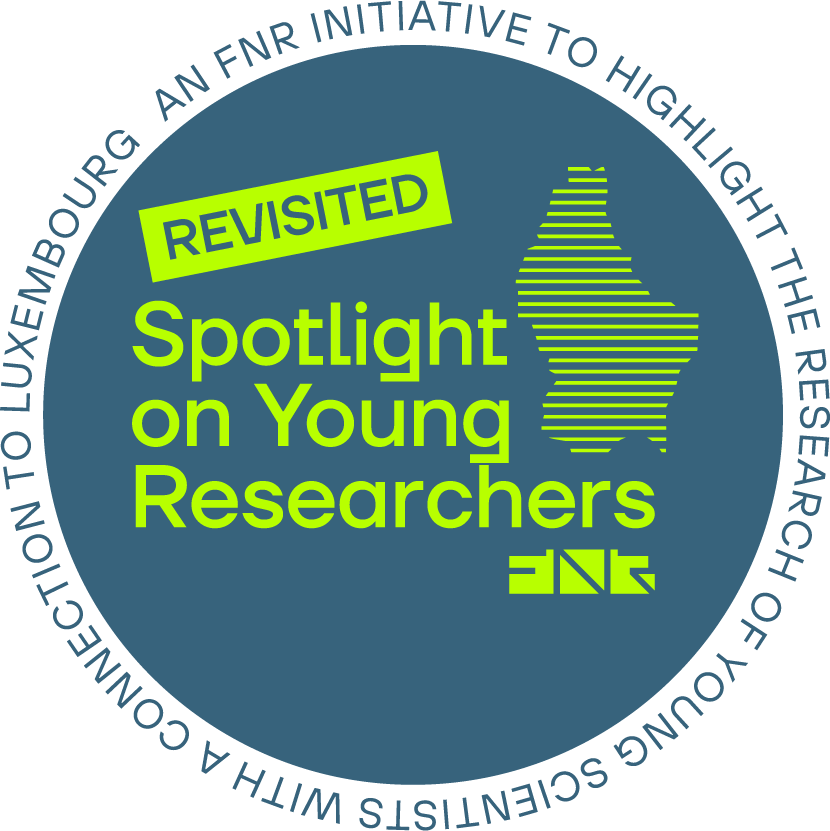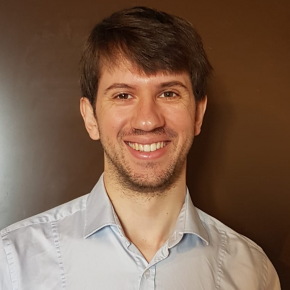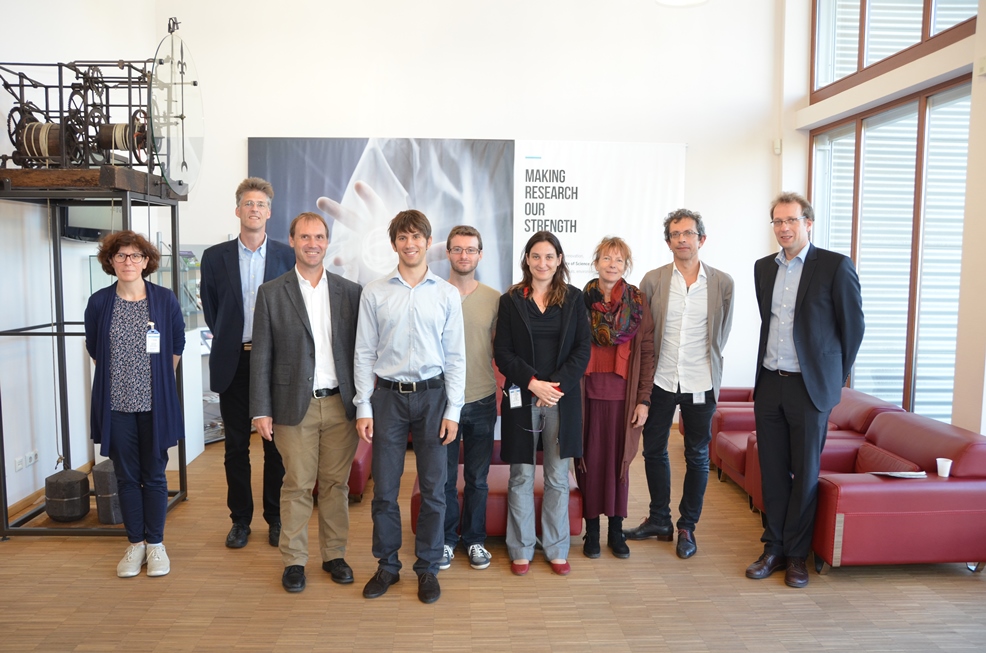BACK TO RESEARCH WITH IMPACT: FNR HIGHLIGHTS
When Guillaume Nataf was featured in Spotlight on Young Researchers in 2017, he had completed his PhD at LIST in the research group of Jens Kreisel (former FNR PEARL Chair, now Rector of the University of Luxembourg), and had just started a Postdoc position at the University of Cambridge. We catch up with Guillaume, now a researcher at CNRS in France with an ERC Starting Grant in his pocket, about where his research journey has taken him over the last years.

Are you still active as a researcher?
“Yes, I obtained a permanent position as researcher in the Centre National de la Recherche Scientifique (CNRS) in France. I am working in a laboratory called GREMAN, specialized in materials, microelectronics, acoustics and nanotechnology.”

Where has your career journey taken you since 2017?
“In 2017, just after my PhD, I joined the University of Cambridge in England, for a postdoc. I stayed there for four years, which were incredibly enriching. I met many new researchers, from all fields, including social sciences. I could set up new collaborations, obtain my own funding, carry out new research. I also had the chance to advocate for postdocs by joining the Postdocs of Cambridge Society.

“I then successfully passed the competition to become CNRS researcher in France. The laboratory where I am working now, GREMAN, is based in two cities: Tours and Blois. There are 70 kilometres between both cities, so it is sometimes a real challenge to commute between the two workplaces, but it is also a great opportunity since each part of the lab has its own way of working and of thinking research.
“I am convinced that this diversity is essential to achieve original research results, and I think that in Luxembourg the inherent cultural diversity was also playing this role. ”Guillaume Nataf CNRS Research Scientist, GREMAN, University of Tours
Looking back over the past eight years, how has your research evolved, and what new areas or projects have you found yourself exploring?
“In Luxembourg I was focusing on a specific type of materials, inorganic oxides, which I was trying to understand at a fundamental level. In England, I completely changed my research topic and focused on organic materials, and in particular liquid crystals. I explored their thermal properties, in view of developing an energy-efficient and environment-friendly refrigeration technology.“
“In France, I am now combining both fields by investigating the thermal conductivity of inorganic oxides, with the aim to control heat flows as easily as electricity, funded by my ERC Starting Grant DYNAMHEAT. ”Guillaume Nataf CNRS Research Scientist, GREMAN, University of Tours
In 2017, we asked you if there was anything particular you would like to achieve in your research career. Your answer in 2017:
“I have a passion for research that relies on understanding the microstructures of materials. Every fundamental progress I make in this direction is an achievement.
“However, I would like to see how all these achievements sum up to provide novel technologies. I also have a passion for teaching fundamental science. Therefore, I am particularly enthusiastic about the wide range of supervising and teaching opportunities on offer during a researcher career.”
8 years later, do you still identify with this answer or how would you answer this question today?
“Understanding, supervising, teaching and providing insights for novel technologies are still at the heart of my work. It is too early to know if the discoveries I was involved in will lead to applications in the coming years, but I hope that they will contribute. I also realize that back in 2017 I had not highlighted enough the importance of working within a community.
“To carry out excellent research requires collaborations, and these collaborations can exist only if there is a strong community investigating a similar topic, supporting young researchers and willing to work together. Keeping these communities live requires time and commitment from everyone, and when it works it can be in my opining considered as an achievement.”
Is there any advice you would like to give early-career researchers, or yourself when you started your research career, if you could go back in time?
“My research career would not have been the same if I had not interacted with so many different persons. Daily progresses and discoveries come very often thanks to the involvement of others: researchers, technicians, engineers, friends. I had already a few cases where friends from school, or people I met around a drink, led to new research topics, often successful. So, if you are a young researcher, don’t stay locked up in your lab, discuss with others, talk about your research and listen to what others have to offer. “
Do you see yourself staying in your current career in the next 5 years?
“I indeed imagine that I will keep working in GREMAN as CNRS researcher. I also hope that I will still be able to continue my collaborations with researchers in Luxembourg. Luxembourg is hosting top scientists in my field, and it is a privilege to still have the chance to work with them. ”Guillaume Nataf CNRS Research Scientist, GREMAN, University of Tours
-
“Would matter be perfect, it would be boring” says Guillaume Nataf, who has an oozing passion for physics and teaching fundamental science. The French national did his PhD in the group of FNR PEARL Chair Jens Kreisel at the Luxembourg Institute of Science and Technology (LIST), in collaboration with the French Atomic Commission (CEA). We spoke to Guillaume, who has just started a Postdoc at the University of Cambridge, about life as a researcher.
Why did you decide to become a researcher?
“A researcher is free! Free to work on the topic he wants, free to choose the amount of time he can dedicate to it, free to build partnerships with the researchers he values. These are the basics of why I decided to become a researcher. And even if reality is more complex, and restraints numerous, these motivations are still at the heart of my research work.”
What is your research about?
“Would matter be perfect, it would be boring. Many intriguing and powerful properties – such as superconductivity, piezoelectricity or magnetoelectricity – can be optimized by engineering microstructures and defects in materials. This explains my passion for microstructures and defects in ferroic materials.
“I image ferroic single crystals at different length scales to understand how their micro- or even nano-structures can be (i) electrically conductive while the material is an insulator, (ii) polar while the material is non-polar.
“A better understanding of these phenomena is of interest for fundamental science, but several applications might also come out of it, such as new piezoelectronic devices controlled by applied stress.”
Is there a typical day for you as a researcher, and what would that look like?
“During a PhD, every day is different. However, if I could perform in a single day everything I did during the three years of my PhD, I would begin by reading a lot of scientific articles to understand what has been done before and what are the remaining challenges.
“Then, I would start experiments. Of course, they would be unsuccessful at the beginning, and I would improve them again and again until I get interesting results. I would analyse these results in details and compare them with findings of other scientists.
“Finally, if an interesting fact pops up, I would spread it abroad with a scientific article and in an international conference.”
In terms of your career in research / science, is there anything you would like to achieve?
“I have a passion for research that relies on understanding the microstructures of materials. Every fundamental progress I make in this direction is an achievement.
“However, I would like to see how all these achievements sum up to provide novel technologies. I also have a passion for teaching fundamental science. Therefore, I am particularly enthusiastic about the wide range of supervising and teaching opportunities on offer during a researcher career.”
You came to Luxembourg to do your PhD, even though you have now moved on to England to do your Postdoc at the University of Cambridge, what is your impression of Luxembourg’s potential in research?
“Luxembourg has borders with France, Belgium and Germany, and is close to the Netherlands and Switzerland. In Luxembourg, there is an unbelievable melt of cultures and knowledge, which are key ingredients for successful research.
“Furthermore, when I looked for a PhD position, I found out that Jens Kreisel had been awarded an excellence award (FNR PEARL). I knew that this award was the guarantee of solid funding to buy samples, build new experiments and travel. During my PhD under the supervision of Jens Kreisel and Nick Barrett I found out that this award was even more since it gave me the opportunity to observe the growth of a new group and research topic in Luxembourg.”
Related highlights
Spotlight on Young Researchers – revisited 5 years later: A post-PhD life in finance
When Eric Finn Schaanning was featured in Spotlight on Young Researchers in 2017, he had just defended his AFR PhD…
Read more
Spotlight on Young Researchers – revisited 5 years later: From drones to space robotics
When we wrote about Miguel Olivares Mendez in the 2017 edition of Spotlight on Young Researchers, the researcher was working…
Read more
Spotlight on Young Researchers – revisited 5 years later: From Luxembourg to Australia
When we wrote about Chetan Arora in the 2017 edition of Spotlight on Young Researchers, he was a Postdoc working…
Read more